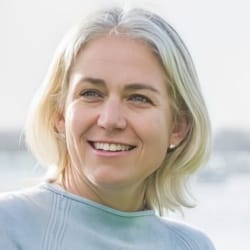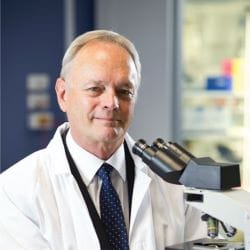
Clarke Medal and Lecture in the Earth Sciences
About the Award
The Clarke Medal is awarded each year for distinguished research in any area of the sciences affecting the planet, excluding Medicine and Veterinary Science, and Agricultural and Environmental Science, conducted mainly in New South Wales. Recipients may be resident in Australia or elsewhere.
Until 2023, the Clarke Medal was awarded in rotation in the fields of geology, botany and zoology. From 2023 onwards, the Clarke Medal is awarded in the earth sciences.
The Clarke Medal and Clarke Memorial Lecture were founded in memory of the Reverend William Branwhite Clarke, one of the fathers of the Royal Society of New South Wales. When the Philosophical Society of New South Wales was reorganized and converted into the Royal Society of New South Wales in 1866, the Rev. W.B. Clarke, because of his acknowledged eminence as a geologist and his scientific services to the Colony, was elected a joint Vice-President, a position which he held until his death on 16th June 1878. This meant that he was effectively the organizer of the Society, as at that time the Governor was ex-officio President. Some Governors did take a specific interest, attending meetings and taking part in discussions.
Shortly after Clarke’s death a memorial fund was opened at a meeting of the Society on 3 July 1878. It was intended that the memorial take the form of annual lectures on geology, free to the public (to be known as Clarke Memorial Lectures), and a gold medal to be presented periodically for distinguished contributions to Australian geology (the Clarke Medal). However, contributions to the Clarke Memorial Fund did not immediately rise to the expectations of the Council, and it was not until October 1879 that it was possible to proceed with one of the schemes, namely, the Clarke Medal.
The Medal was to be awarded “for meritorious contributions to Geology, Mineralogy and Natural History of Australasia, to be open to men of science, whether resident in Australasia or elsewhere”. The Council decided that the Medal be made of bronze instead of gold, as originally intended, and a pair of dies was ordered from J.S. & A.B. Wyon of London at a cost of 100 guineas. The obverse side of the Medal bears a portrait of the Rev. W.B. Clarke looking to the left, beautifully engraved, as was all the work done by J.S. & A.B. Wyon at that time.
The Wyon family were practising medallists for a great many years and five in succession held the appointment of Medallist to the reigning Sovereign. At the Society’s Annual General Meeting on 12 May 1880 the names of the first recipients of the Clarke Medal were announced. The Medal for 1878 was to be awarded to Professor Richard Owen of the British Museum, famous for his studies of Australian vertebrate fossils; for 1879 to Mr. George Bentham of the Royal Gardens Kew, who made a major contribution to the study of the Australian flora; and for 1880 to Professor T.H. Huxley of the Royal School of Mines, London, for his valuable contributions to the knowledge of the natural history of Australia.
Over 50 Clarke Medals have been awarded.
(The above notes were compiled by William Griffin, using notes on the history and purpose of the awards supplied by Dr David F. Branagan.)
Clarke Medal and Lecture in the Earth Sciences 2023
The Clarke Medal and Lecture in the Earth Sciences for 2023 has been awarded to Professor Moninya Roughan FRSN of the School of Biological Earth and Environmental Sciences at UNSW Sydney. Professor Roughan s an outstanding oceanographer and authority on the dynamics of the East Australian Current, ocean observing and prediction systems, and their application to understanding western boundary currents and continental shelf processes. She currently leads the Coastal and Regional Oceanography Lab at UNSW – where she has made important, far-reaching contributions to our understanding of continental shelf processes and western boundary current warming through the use of new technologies. An internationally acknowledged leader in her field, she is also dedicated to the training of the next generation of scientific leaders.

Clarke Medal 2022
The Clarke Medal for 2022, in the field of Geology, has been awarded to Professor Andrew (Andy) Baker FAGU, of the School of Biological, Earth & Environmental Sciences at UNSW Sydney. Professor Baker is an international authority in cave science, hydrology and geochemistry, especially as it pertains to our understanding of karst — complex underground systems formed from dissolution of soluble rocks, characterised by sinkholes, caves and speleothems (e.g., stalagmites). Having led over AU$10M in external projects in NSW since 2010, he has also published more than 260 internationally refereed papers, including highly-cited publications in Nature, Nature Communications, and Science.

Clarke Medal 2021
The Clarke Medal for 2021, in the field of Zoology, has been awarded to Distinguished Professor Emeritus John Aitken FRSN FAA FAHMS FRSE of the College of Engineering, Science and Environment at the University of Newcastle. Professor Aitken is a global leader in reproductive biology and the 2012 NSW Scientist of the Year. Based at the University of Newcastle, he is President of the International Society of Andrology, Director of the Priority Research Centre in Reproductive Science and Professor of Biological Sciences. Professor Aitken heads up a research team that is making significant inroads into human and animal reproductive issues. His research achievements include identifying a major cause of male infertility that has resulted in new methods of therapeutic intervention, and the development of a contraceptive that would prevent pregnancy and inhibit the spread of sexually transmitted diseases.
Professor Aitken currently has an active program of research to develop non-surgical methods of sterilisation for domestic and feral animals. Nationwide, the damage done by vertebrate pests to Australian biodiversity and agricultural productivity amounts to $1 billion per annum. In response to this need, Professor Aitken’s research group has developed a technology for the non-surgical sterilization of mammalian species that opens up a market worth billions of dollars per annum.

Clarke Medal 2020
The Clarke Medal 2020, in the field of Botany, has been awarded to Distinguished Professor Michelle Leishman of the Department of Biological Sciences at Macquarie University. Professor Leishman is internationally recognised for her work in plant ecology. In particular, her studies are directed towards understanding the success of invasive plant pathogens, vegetation responses and adaptation to climate change, plant conservation, and facilitating resilient urban green spaces. She has a number of active research programs which include development of a database for greening urban space, studying invasive plants and pathogens and climate vegetation response and adaptation to global climate change.

List of Past Recipients of the Clarke Medal
| Year & Recipient | Year & Recipient |
|---|---|
| 1878 Professor Sir Richard Owen 1879 George Bentham 1880 Professor Thomas Huxley 1881 Professor F. M’Coy 1882 Professor James Wright Dana 1883 Baron Ferdinand von Mueller 1884 Alfred R.C. Selwyn 1885 Sir Joseph Dalton Hooker 1886 Professor L.G. De Koninck 1887 Sir James Hector 1888 Rev. Julian E. Tenison-Woods 1889 Robert Lewis John Ellery 1890 George Bennett 1891 Captain Frederick Wollaston Hutton 1892 Sir William Turner Thiselton Dyer 1893 Professor Ralph Tate 1895 Robert Logan Jack 1895 Robert Etheridge, Jnr. 1896 The Hon. Augustus Charles Gregory 1900 Sir John Murray 1901 Edward John Eyre 1902 F. Manson Bailey 1903 Alfred William Howitt 1907 Professor Walter Howchin 1909 Dr. Walter E. Roth 1912 W.H. Twelvetrees 1914 Sir A. Smith Woodward 1915 Professor W.A. Haswell 1917 Professor Sir Edgeworth David 1918 Leonard Rodway 1920 Joseph Edmund Carne 1921 Joseph James Fletcher 1922 Richard Thomas Baker 1923 Sir W. Baldwin Spencer 1924 Joseph Henry Maiden 1925 Charles Hedley 1927 Andrew Gibb Maitland 1928 Ernest C. Andrews 1929 Professor Ernest Willington Skeats 1930 L. Keith Ward (Geology) 1931 R.J. Tillyard (Entomology) 1932 F. Chapman (Palaeontology) 1933 W.G. Woolnough (Geology) 1934 E.S. Simpson (Mineralogy) 1935 G.W. Card (Geology) 1936 Sir Douglas Mawson (Geology) 1937 J.T. Jutson (Geology) 1938 H.C. Richards (Geology) 1939 C.A. Süssmilch (Geology) 1941 P. Wood Jones (Zoology) 1942 W.R. Browne (Geology) 1943 W.L. Waterhouse (Botany) 1944 W.E. Agar (Zoology) 1945 W.N. Benson (Geology) 1946 J.M. Black (Botany) 1947 H.L. Clark (Zoology) 1948 A.B. Walkom (Palaeobotany) 1949 Rev. H.M.R. Rupp (Botany) 1950 I.M. Mackerras (Zoology) 1951 F.L. Stillwell (Geology) 1952 J.G. Wood (Botany) 1953 A.J. Nicholson (Entomology) 1954 E. de C. Clarke (Geology) 1955 R.N. Robertson (Botany) 1956 O.W. Tiegs (Zoology) 1957 Irene Crespin (Geology) 1958 T.G.B. Osborn (Botany) | 1959 T. Iredale (Zoology) 1960 A.B. Edwards (Geology) 1961 C.A. Gardner (Botany) 1962 H. Waring (Zoology) 1963 G.A. Joplin (Geology) 1964 J.W. Vickery (Botany) 1965 M.J. Mackerras (Zoology) 1966 D. Hill (Geology) 1967 S. Smith White (Botany) 1968 H.G. Andrewartha (Zoology) 1969 S. W. Carey (Geology) 1970 G. Whitley (Zoology) 1971 N.T. Burbridge (Botany) 1972 H. King (Geology) 1973 M.D. Hatch (Botany) 1974 C.H. Tyndale-Biscoe 1975 J.N. Jennings (Geography) 1976 Lilian R. Fraser 1977 A. Trendall (Geology) 1978 D.T. Anderson 1979 L.A.S. Johnson 1981 W. Stephenson 1982 N.C.W. Beadle 1983 K.A.W. Crook (Geology) 1984 Michael Archer (Palaeontology) 1985 H.B.S. Womersley 1986 David J. Groves (Geology) 1987 Anthony James Underwood 1988 Barry Garth Rolfe 1989 John Roberts (Geology) 1990 Barrie Gillen Molyneux Jamieson (Zoology) 1991 Shirley Winifred Jeffrey (Biology/Botany) 1992 Alfred Edward Ringwood (Geology) 1993 Gordon C. Grigg (Zoology) 1994 Joint award: Craig Anthony Atkins & Barbara Gillian Briggs (Botany) 1995 Christopher McAuley Powell (Geology) 1996 Klaus Rohde (Zoology) 1997 Charles Barry Osmond (Botany) 1998 Richard Limon Stanton AO (Geology) 1999 Richard Shine (Zoology) 2000 Sarah Elizabeth Smith (Agriculture) 2001 Gordon H. Packham (Geology) 2002 Professor Robert Hill (Botany) 2003 Professor Lesley Joy Rogers (Zoology) 2004 Professor Ian Plimer (Geology) 2005 Professor Mark Westoby (Botany) 2006 Professor Anthony Hulbert (Zoology) 2007 Professor Suzanne O’Reilly (Geology) 2008 Professor Bradley Potts (Botany) 2009 Dr Winston Ponder (Zoology) 2010 Professor Kenton Campbell (Geology) 2011 Professor Byron Lamont (Botany) 2012 Professor Marilyn Renfree (Zoology) 2013 Professor William Griffin (Geology) 2014 Professor Robert Park (Botany) 2015 Prof. Christopher Dickman (Zoology) 2016 Professor Simon P. Turner (Geology) 2017 Professor David Keith (Botany) 2018 Professor Emma Johnston AO (Zoology) 2019 Professor Dietmar Müller (Geology) 2020 Professor Michelle Leishman (Botany) 2021 Professor Robert John Aitken (Zoology) 2022 Professor Andrew Baker (Geology) 2023 Professor Moninya Roughan (Earth Sciences) |